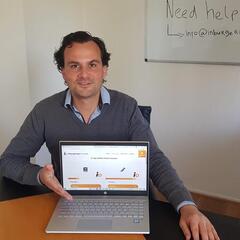How to self-study for the Dutch integration exams
Are you a non-EU citizen and do you wish to apply for Dutch nationality or for permanent residence in the Netherlands? Then you probably know that one of the requirements is to pass the Dutch integration exams, also known as the inburgeringsexamen. Bart Nawijn from InburgeringOnline.nl provides some useful self-study tips to help you pass.
The Dutch integration exams, also known as the inburgeringsexamen, are a necessary part of becoming a citizen or a resident of the Netherlands.
There are two groups of exam candidates:
- People who have lived in the Netherlands for at least five years and voluntarily apply for permanent residence or for a Dutch passport.
- People who have received a temporary residence permit and are required to pass the exams within three years. This group mainly consists of refugees (vluchtelingen) and family migrants (gezinsmigranten).
Sounds scary right? Don’t worry, in this article you will get some valuable tips that make your exam preparation a lot easier.
The integration exams
To become a Dutch permanent resident or citizen, you must pass a total of five exams. Four of the exams are about the Dutch language and are divided into: reading, listening, writing and speaking. There is also the KNM exam, which is about your knowledge of Dutch culture and society.
The language exams are at A2 level (beginner) or B1 level (intermediate), depending on the date you arrived in the Netherlands. If you are not sure which level applies to you, it is recommended to contact DUO (The Education Executive Agency) or the IND (Dutch immigration authorities).
Exam preparation
To prepare for these exams, you will obviously need to have a certain level of Dutch and there are many courses at schools which help you to get ready for the exams. However, a lot of the skills and knowledge can also be learned through self-study. In fact, there are many students who have successfully passed their exams just through self-study in only a couple of months.
5 handy self-study tips
Below you will find five valuable self-study tips:
1. Set a clear objective and timeframe for your exams
It always helps to set a clear objective for yourself. This will motivate you and bring structure to your studies. One way of doing this is to just set an exam date. You can register for the exams - usually two to three months in advance - on the DUO website.
To give you an indication of how much study time you need, it is normally recommended to take around four to five months to get from A0 (complete beginner) to A2.
In order to get from A2 to B1, it is also recommended to study for at least four to five months. However, this also depends on your learning speed. If you are a quick learner and good at studying independently, the timeframe could be (a lot) shorter.
2. Get familiar with the exam formats as soon as possible
Once you have set an exam date, study the exam formats as soon as possible by doing practice tests. At this stage, there will probably be a lot of things you do not understand yet but that is not the point. By carefully looking at the format of the official practice exams, you will know what is expected from you. This knowledge will make your studies more comfortable and structured.
You can find practice exams on DUO's Inburgering website and inside Inburgering Online's self-study courses.
3. Vocabulary: Increase your vocabulary with your own personalised word list
Obviously, knowing enough words is essential if you want to start understanding and speaking a new language. The more words you know, the more comfortable and enjoyable it becomes to practice Dutch.
Memorising words is not difficult but it takes effort and is not the most fun part of the language learning process. This is why it is recommended that you start your own list of unknown words that you hear or see during the day and write them down in a notebook or on your phone. This way, you learn words that you are personally interested in and it also puts you in a nice proactive state of mind during the learning process.
4. Pick out the easy bits of grammar
Besides studying vocabulary, you will also need to practice grammar. The advantage of Dutch grammar is that it is structured and it has clear rules. What is challenging is that these rules are sometimes quite unique and counter-intuitive than what you might be used to from your own native language.
However, it is important to know that only a few of the grammar topics are difficult and most are easy to learn and apply. Once you realise this, you will become more motivated to keep learning. At A2 level, for example, Dutch sentence structures are considered to be a difficult topic for many students. The majority of the other grammar topics tend to be much easier to navigate.
5. Surround yourself with Dutch on a daily basis
Surround yourself with Dutch regularly through TV, radio, music etc. You should also look for things that you personally find interesting, this way you will be much more motivated to understand what is being said.
Also, whenever you don’t understand something, don’t worry about it. This is completely normal and giving yourself a hard time for not understanding things just negatively influences your learning.
Bonus tip
Regarding the order of studying the skills and taking each exam, it's recommended to first work on receptive skills (reading and listening), followed by productive skills (speaking and writing). Finally, you can prepare for the KNM (knowledge of Dutch society) exam.
Planning to take the inburgeringsexamen but aren’t sure where to start? At InburgeringOnline.nl, you can prepare for the exams through guided self-study - no books or classes required.



COMMENTS
Leave a comment